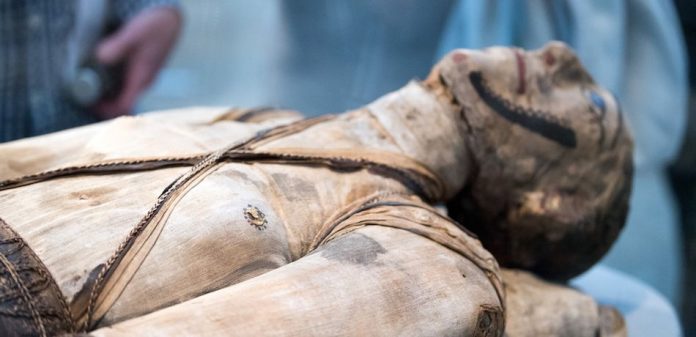A pair of Egyptian mummies known as the “Two Brothers” were in fact half brothers, British scientists have revealed. The men, who died in about 1800BC, have taken pride of place in Manchester Museum for more than a century but experts have disputed whether they were brothers.
Their shared burial chamber was discovered over 110 years ago, but Khnum-Nakht and Nakht-Ankh were mummified and buried almost 4,000 years ago, during the 12th Dynasty of Egypt. Based on the inscriptions on their coffins and the fact they shared a burial chamber, the two men were thought to be brothers, and were given the moniker Two Brothers.
About a year later, when the mummies were unwrapped in 1908 at the University of Manchester in the United Kingdom (they are still housed in the Manchester Museum), morphological differences in their skeletons raised doubts about the two men being brothers, with some people suggesting one of the brothers was adopted. And the debate has gone on since, till this week, that is, when ancient DNA analysis settled the matter for good.
According to the inscriptions, the Two Brothers were both born to a woman called Khnum-aa and were fathered by an unnamed local governor. DNA extracted from the teeth of the two skeletons was analyzed by researchers from the university in 2015, and their analysis showed both men likely had the same mother.
But the more factually accurate moniker for them (though not quite as catchy perhaps) would have been Two Half-Brothers, since it turns out the two formerly high-ranking Egyptians were sired by different men.
“It was a long and exhausting journey to the results but we are finally here. I am very grateful we were able to add a small but very important piece to the big history puzzle and I am sure the brothers would be very proud of us. These moments are what make us believe in ancient DNA,” Konstantina Drosou from the university said in a statement Wednesday.
Nakht-Ankh was the elder of the two, 20 years older than Khnum-Nakht, but it was the latter who died first, six months before his elder half-brother. More care was also taken in the mummification and burial process for the Nakht-Ankh than for Khnum-Nakht, suggesting the latter may have died unexpectedly.
The burial site where the Two Brothers mummies were found was discovered untouched in 1907, in a cemetery outside a village 250 miles south of Cairo. The Deir Rifeh site was excavated in 1906 and the burial chamber was actually in the courtyard of a bigger tomb.
“Our results provide an intriguing insight into one facet of ancient Egyptian kinship, and illustrate the potential use of matrimonial alliance as a means of social reinforcement among the elite and sub-elite. Unfortunately, placing our results in a broader context is difficult because we are unaware of any comparable examples of two men buried together in an intact Pharaonic tomb,” the researchers wrote.
The open-access study detailing the findings was published in the Journal of Archaeological Science under the title “The kinship of two 12th Dynasty mummies revealed by ancient DNA sequencing.”















